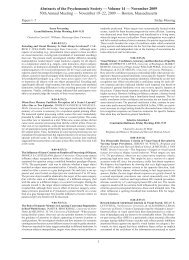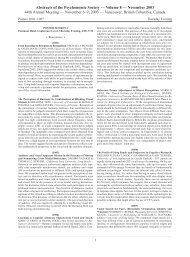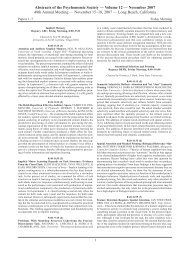Abstracts 2005 - The Psychonomic Society
Abstracts 2005 - The Psychonomic Society
Abstracts 2005 - The Psychonomic Society
Create successful ePaper yourself
Turn your PDF publications into a flip-book with our unique Google optimized e-Paper software.
Friday Afternoon Papers 132–133<br />
4:50–5:05 (132)<br />
Belief Trumps Logical Structure. RUSSELL REVLIN, University of<br />
California, Santa Barbara, AARON J. RICE, University of Pennsylvania<br />
School of Medicine, & DUSTIN P. CALVILLO, University of<br />
California, Santa Barbara—In a counterfactual reasoning study, university<br />
students were asked to certify the consistency among a set of<br />
three statements: One was a generality about which they had a prior<br />
belief; the other two were pertinent facts. <strong>The</strong>y then had to accept a<br />
fourth statement, “for the sake of argument,” that introduced inconsistencies<br />
into the set. To restore consistency, subjects rejected two statements<br />
in light of the assumption. Prior research proposes that (1) students<br />
restore consistency by imagining a possible world based on the<br />
lawlike characteristics of the generality and (2) the logical structure of<br />
the statements, and not their believability, controls the counterfactual<br />
strategy employed. In contrast, by using a wider range of beliefs among<br />
the statements, the present study shows that the effect of logical structure<br />
is illusory: <strong>The</strong> logical forms alter the post hoc believability of the<br />
statements, so that the decisions are based primarily on belief.<br />
21<br />
5:10–5:25 (133)<br />
Belief Bias and Working Memory: Implications for Impulsivity.<br />
ALLISON MATTHEWS, PAUL WHITNEY, & JOHN M. HINSON,<br />
Washington State University (read by Paul Whitney)—We previously<br />
demonstrated that working memory (WM) loads increase impulsive<br />
decision making in a simulated gambling task. <strong>The</strong> present study extends<br />
these results to the relationship between individual differences<br />
in WM and temporal reasoning. Participants judged whether a conclusion<br />
followed logically from a set of premises. For example, the<br />
conclusion “Elvis starred in Jailhouse Rock during the rock-n-roll<br />
era” is not a logically valid conclusion from the following premises:<br />
<strong>The</strong> rock-n-roll era was before the punk music era, grunge music was<br />
popular before the punk music era, <strong>The</strong> Silence of the Lambs was released<br />
during the punk music era. <strong>The</strong>re is a general tendency to accept<br />
an invalid conclusion as valid when the conclusion itself is believable.<br />
Our data demonstrate that people with lower WM spans are especially<br />
susceptible to belief-based errors. <strong>The</strong> results support a general model<br />
of impulsivity that treats prior beliefs as a prepotent response.





